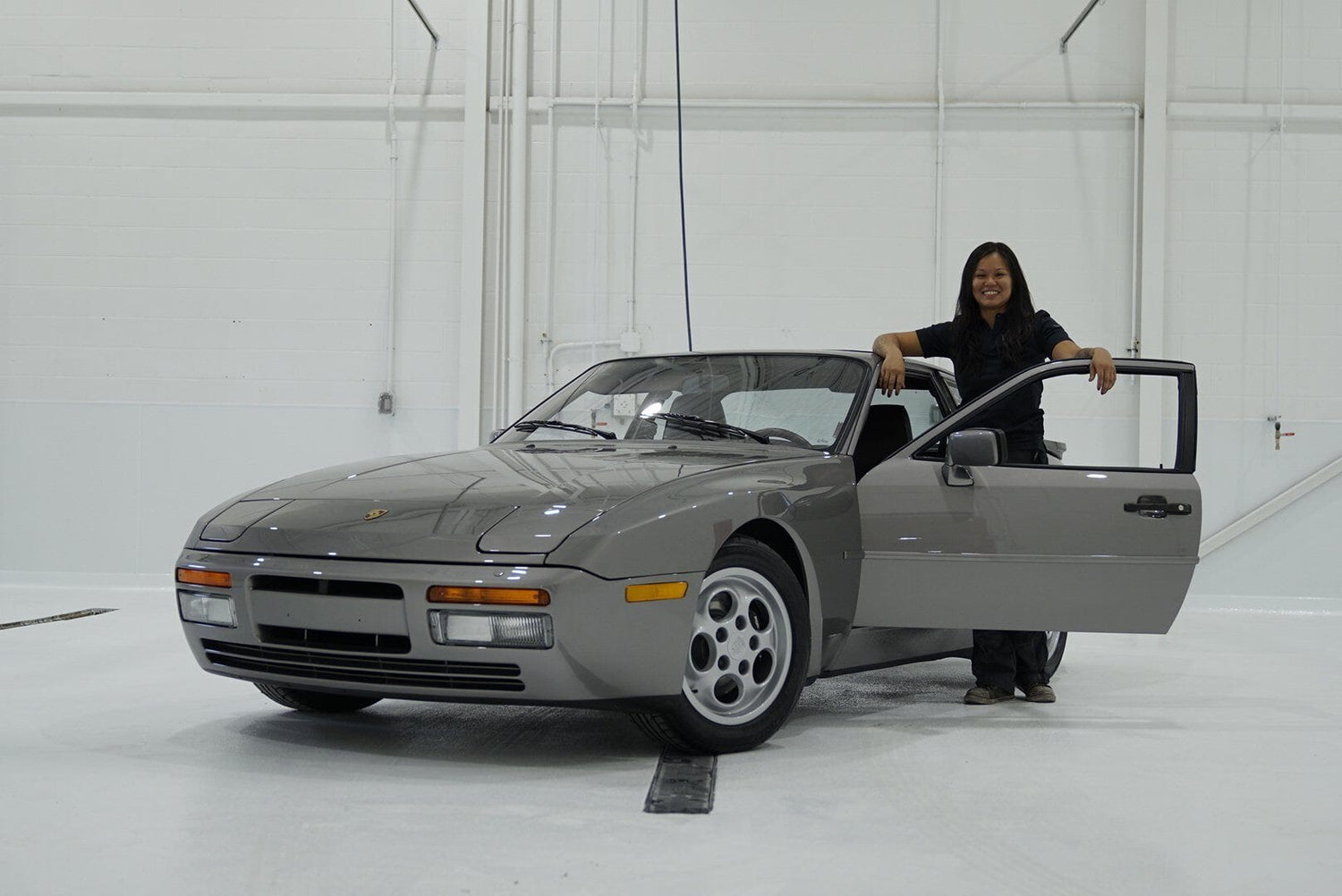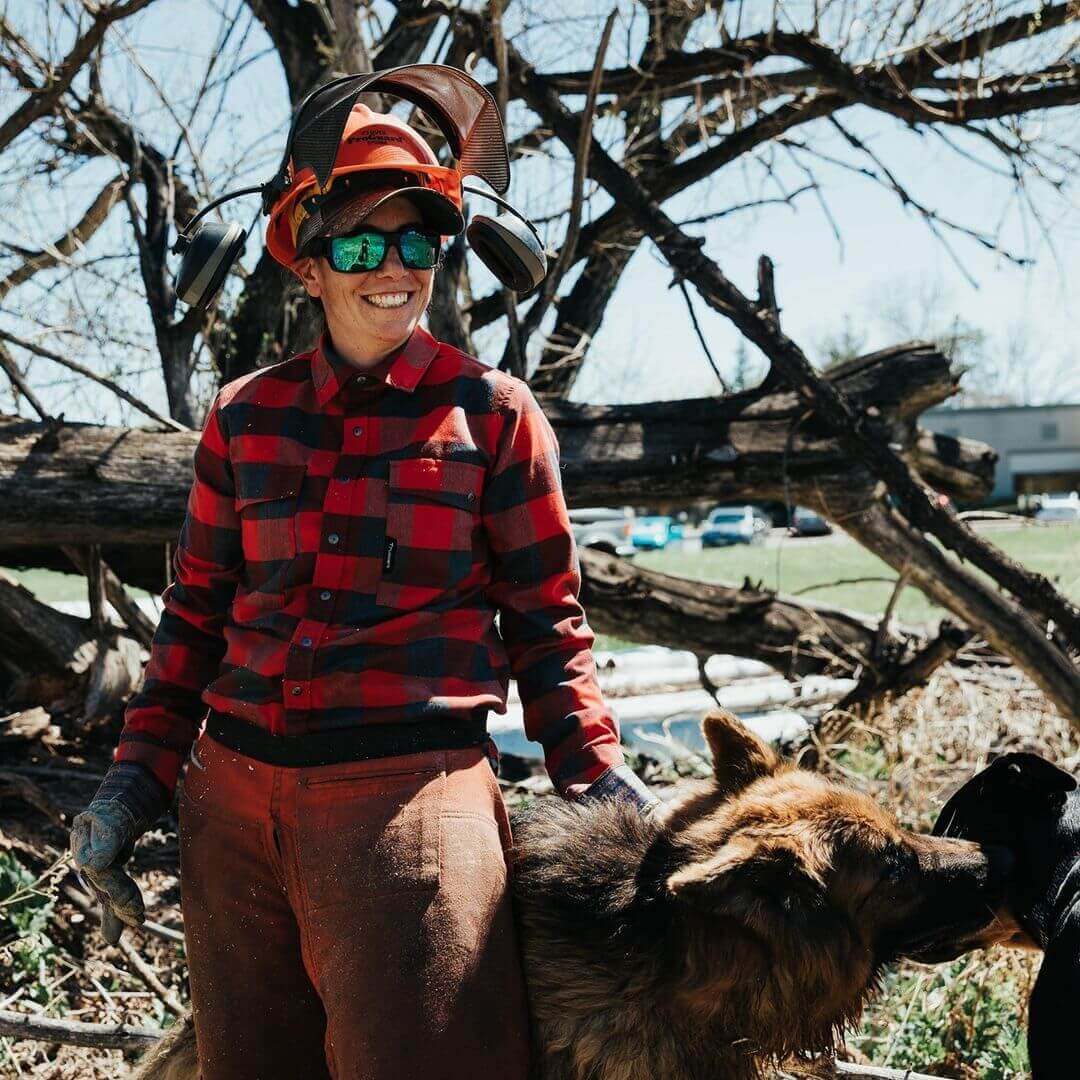“My mother calls it ‘The Order of Precedence’. It goes something like: finish high school, go to college, get married — very traditionally boomer expectations in my opinion.” This was the path Truewerk’s Head of Marketing had drilled into him from an early age. That your life — and success — runs through a college education.
It was the career path Kyle Stumpenhorst initially walked as well. You may not know it from his immensely successful YouTube channel and reputation as a down-to-earth tradesman, but Stumpenhorst is a graduate of North Central College with a degree in computer science. This led him to a 9-to-5 IT job, sitting in an office and making a decent salary, so why bother learning a trade?
That standard career path is what everyone tells us we should want, right? Not Kyle.
Life behind a desk wasn’t for him. While some people thrive in the corporate world, Stumpenhorst found it boring and unfulfilling. He knew it wasn’t a career path he could stay on forever, so when opportunity came knocking, he answered the door.
Presented with the option to buy an old farmhouse in need of a lot of work, Stumpenhorst remembered growing up watching his dad remodel homes on the weekends and decided he could tackle the renovations himself. It was hard — yet fun. But, most importantly, learning a trade lit a spark inside him.
As he learned more and more about skilled trades, each project he completed gave him a sense of accomplishment and joy he didn’t get from his IT job. Weekend projects became side jobs, and side jobs became a new obsession: he was going to quit his job, start a business, and never look back.
“I think I'm the type of person that when I have an idea, it just festers and grows, and I continually think about how I can make it a reality,” said Stumpenhorst on his desire to start learning a trade. “My wife always reminds me that she remembers me laying in bed at night, six months pregnant, and just saying, ‘I'm going to do this. I think I'm going to do this’, and she was freaking out.”
Kyle Stumpenhorst, valedictorian of his high school class and self-proclaimed computer science guy was ready to step up into the skilled trades. He understood his wife’s concerns; there remains a heavy stigma attached to skilled tradespeople.
“I wasn’t a construction worker type… there’s a stigma. I didn’t think it was ever going to be something I would do because my plan was to have some big office job making a bunch of money,” explained Stumpenhorst who went on to discuss the benefits of learning a trade. “It was hard for me to swallow that pill. Were people going to think less of me? I guess I didn’t really care. What I do is awesome. I choose my hours, I choose my wage because the harder I work, the more money I’m making.”
Even as fewer students enroll in college, high-paying trade jobs remain empty. Maybe if that misconception about the trades not being a worthy pursuit didn’t exist, Stumpenhorst and millions of other high school students would have come to trade careers sooner.

ONE CAREER PLAN TO RULE THEM ALL…LIES
This dogmatic focus on a bachelor’s degree needs to stop; the idea that college is the sole path for everyone is laughably outdated, especially when learning a trade is more accessible than ever.
Master Electrician Liam Neet said he knew as a teen that college wasn’t for him, but that didn’t stop everyone from parents to aunts and uncles telling him, “go to college or you won’t amount to anything.” Well, joke’s on them, with 17 years in the industry and his own successful skilled trades business — Faraday Electric — he’s proven that idea wrong. And his example is just one of many similar stories.
Our society needs to take a good look at people like Stumpenhorst and Neet who have forged their own paths in life by learning a trade. There’s no right or wrong way to achieve your own success and if we don’t start telling that to future generations, we’re going to continue misleading them with false hopes and resigning them to low-paying jobs.
“The millennial generation is saddled by debt from college,” said Neet — and he’s right, the average millennial is making $35,000 a year with student loan debt of nearly $30,000 hanging over their heads. “If I ever have kids, I’m going to hope they go into the trades. People are wrong. You can become something in the trades.”
Yet, society continues to push college as the only guaranteed path to success, even though learning a trade can be an incredibly profitable venture. Why?
Short answer: the post-World War II G.I. bill made college broadly accessible for the first time in history creating a historical domino effect that led to college being thought of as the primary path for everyone.
Longer answer: Over the past 50 years society has come to view skilled trades as jobs people are forced into when they don’t have other options — “dirty,” and less valuable than a 4-year education. Most people have pushed aside and diminished the contributions of trade professionals like electricians and HVAC technicians — not even giving the value of learning skilled trades a thought until they’re cutting a check for work they need done.
This marginalization creates a skewed perception.
Nhu Nguyen, the first woman certified as a classic Porsche technician in North America, agreed, “Our perceptions are based on our realities. If you’ve never met a successful auto mechanic, you might keep thinking it’s a dirty, smelly job for stupid people because you haven’t had any experiences to show you differently. What you’ve been told and what you’ve seen is what you believe. I think the way to change the perception of the skilled trades is just to create more exposure. Show people otherwise.”
That’s exactly what trade pros like Stumpenhorst and Nguyen are doing, and by learning a trade, you can too.
THE TRADES GO DIGITAL
While Mike Rowe may have brought Dirty Jobs into a more cultural mainstream through television, professionals like Stumpenhorst, Nguyen, the Perkins Brothers, and so many more are showing a new generation the beauty of skilled trades.
“I think auto parts can be kind of beautiful, so I just started documenting what I was doing,” said Nguyen on her Instagram account, “Then like ‘Dear Abbey’ or something, I started getting questions about the trades and being told I was inspiring other women to pursue something less traditional because I’m showing them this can be really rewarding.”
Stumpenhorst also gets messages from people saying they would love to be learning a trade, doing what he’s doing or even that they made the leap. People are restless in their desk jobs, and it’s not their fault — they got pigeonholed into that, but now are able to see what else is out there.
“They’re sitting at their desk, watching my videos, thinking, ‘I wish I could do that. It looks awesome.’ I think that’s pretty crazy because that never would have been the case back in the day. They would have driven through a construction site and thought, ‘Man, must suck to be there.’ And I think that has changed because people are able to showcase really how great it can be,” said Stumpenhorst.
Learning a trade and experiencing what someone else does, emotionally and visually, is in the palm of your hand with social media. With 72% of all teens actively using social media and 121 million users nationwide, this is monumental for the future of skilled trades. All it takes is someone stumbling across a video from a mechanic or carpenter on their “discover page” to spark an interest that might one day lead to a career. For all of its woes, social media is doing one thing right: transforming the perception of the industry and all that learning skilled trades entail.
“There’s really a lot of cool content focused around tradespeople and the work they do. I feel like social media is allowing outsiders to see the art behind the work versus just some grunts that didn’t graduate high school who HAD to put a tool belt on. People have really been able to showcase the real passion behind their trade,” continued Stumpenhorst.
Beyond social media providing new ways to shed light on the perks, passion, and rewards of a skilled trades job, the trades are also a really viable career in today’s economy. Learning a trade is a fantastic way to ensure that you’re able to keep generating income, as they’ll always be in demand.
If the last 12 months of bullshit (bizarre snowstorms in Texas, crowded hospitals, and remote work because of a pandemic, hurricanes, and let’s be real, many, many more setbacks) have shown us anything, it’s that the trade industry is essential. It’s always going to be needed to keep our communities running safely and efficiently. There’s something not only profound about that, but it also means a really good life off the job site, too. Simply put, learning a trade can lead to a career path with endless potential.
ALL WORK, ALL PLAY
Skiing, playing soccer, yoga, hiking, backpacking, mountain biking — Neet does it all. “All the typical Colorado stuff? This career has absolutely afforded me the ability to do all those things. No question about it,” affirmed Neet. It’s a topic he lights up talking about.
“I'm an electrician. It’s the best job I could have ever asked for. Ever,” said Neet. His happiness from his job bleeds into all other areas of his life. So does the drive it’s given him. He has a dog he loves, his own home, is always learning something new, and says he is thriving. He’s living his American Dream and doing something that is gratifying every day.
Neet explains that to him, achieving the American dream and pursuing a life in the skilled trades haven’t been mutually exclusive ideas. Want a white picket fence? It’s time to step and build it yourself, your own way, on your own terms. Want the dream home? “You’ll probably know a general contractor who will help you build that too,” he joked.
There isn’t a singular American Dream — there are 382 million unique ones and success looks different for each one. For Stumpenhorst, learning a trade meant finding something that he cared about, was good at, and could make a good living for his family.
“I just remember feeling like: this, THIS is how I will become successful because I busted my tail, I gave somebody a job well done, and I made good money from it. It was a very rewarding and freeing feeling, knowing that I did everything. I determined my success on that job, 100%,” said Kyle.
In fact, after his first two weeks of work, Stumpenhorst said he remembers coming home on a Friday and telling his wife that they should plan a vacation because he made more money in that timeframe after learning a trade than he had from a month working his desk job.
Nguyen, Stumephorst, and Neet have found what makes them happy, what gets them excited to get up every morning and motivated to succeed: skilled trades.
“Honestly, most of life and happiness, in general, is setting a goal and attaining that goal. And then what do you do? You set another goal and you go after that. It's that motivation. It's that drive that I think people don't understand that they need that in their lives. They're willing to be complacent with what they have. And not that you always have to be chasing some dragon, but at the same time it's good to have goals. It's good to make shit happen for you,” said Neet
Learning a trade leads to a career path that’s open to everyone. This new generation of media-savvy trade professionals is accelerating and recognizing changes within the community too. The misconception that the trades require a certain type of person is slowly starting to diminish.
“I think there was sort of this stigma, especially when I first started that you've just got to be the dude-liest dude in the world to be in trades. And I don't think that's necessarily the case anymore,” said Neet.
Stumpenhorst agrees the profession is changing and that the demographic of people who are getting out there and learning a trade is shifting, “I definitely think that when you look at tradesmen that are up and coming or my age, they're not your typical tradesmen that your parents might've hired to do a job at your house. I mean, I don't know if it's just a generational thing, but if you know the young people that are doing it, they're a little bit more passionate.”
And that restlessness that Stumpenhorst experienced, along with so many others, doesn’t exist for any of the skilled trades professionals we’ve encountered. What you do is in your own hands — literally and metaphorically. Learning a trade puts you in control.
“All of it is so rewarding. I'm outside all the time. I get exercise every day. I can bring my dog with me. I'm always somewhere new. It's awesome. There’s something to be said about everyone getting and throwing in a bunch of work and making a job look picture perfect after,” said Neet.
That’s the most common thing we hear about life in the trade industry: It’s rewarding. It may not always be easy, but it definitely gives you a reason to feel proud, challenged, and fulfilled every day.
For Nguyen, she’s been afforded opportunities that could only arise by learning a trade in her profession. Memories she cherishes, like riding around a track with the president of Porsche Canada, Marc Ouayoun, in an ‘87 944 Turbo that she restored and receiving the Passion Award for her work.
“I think I got that award because I really do love what I do,” said Nguyen. “I love the product that I work on, I love what I get to do, I love the people I work with. The people I’ve met. It’s been an overall amazing experience.”
TOMORROW’S TRADEWORK
There’s a bright future for people in the skilled trades, as well as those just getting started learning a trade. Interest in trade and vocational schools is increasing, people are at least talking about the skills gap and more people are returning to the original meaning of the American dream — about the freedom of choice and how to live.
However, we can’t wait for the New York Times to show up and start telling their audience how great the skilled trades are. We have to live it every day and keep our own house in order; continuing to elevate people like Nguyen, Stumpenhorst, and Neet and bringing new ideas, technologies, and getting people excited about learning a trade.
“There are guys out there that are at retirement age and they've been doing the same thing. Nobody's been there to take pictures. They've had no place to show it off. They've just collected a paycheck. And it's not their fault that that's just the way it was. But now, we've all got an opportunity to share, to be applauded, to feel like we're making a difference,” said Stumpenhorst.
Leverage the technology whether you’re in the trade industry or want to be. Let the secret out: the trade industry isn’t what it used to be. You can run a business you love from a new rooftop every day because you decided that learning a trade was the path you wanted to follow.
To Neet, the future of skilled trades lies in women. “Women are the future. We need more female outreach in the trades. I think there’s plenty of women out there with mechanical ability that could absolutely be doing this.”
But, it starts with the current community, and it starts right now.
“You could start today, or you could start six months from now. But if you start today, in four years, you're going to be where you wanted to be. If you start six months from now, it's going to be four years and six months until you get what you need,” said Neet.
This is the start of something big. With more and more people excited about learning a trade, there’s a new dawn in the trades — a new generation of industrial athletes revitalizing age-old work. They’re bringing intelligence, creativity, and an entrepreneurial spirit to the trades driven by passion, not as a last resort.
Our start is helping to fix what’s broken in men’s workwear and women’s workwear, while striving to elevate the lives and work of modern tradesmen and tradeswomen.
ABOUT TRUEWERK
Truewerk has revolutionized the workwear industry, offering an integrated workwear layering system — each piece is designed to work together to deliver unparalleled comfort, performance, and durability. Whether you’re a skilled trades pro or just getting started learning a trade, you’ll find exactly what you need at Truewerk.
Our men’s collection includes Our men’s collection includes shirts, tees, and polos.shirts, tees, and polos, pants, shorts, and bibs, and jackets, hoodies, and vests. Our women’s collection includes pants and shorts, Our women’s collection includes shirts, tees, and polos.shirts, tees, and polos, and jackets and hoodies. We also offer top-of-the-line accessories, including shirts and hats, socks and underwear, and belts and other essentials. In short, we make it easy to put together a workwear wardrobe that feels and performs as good as it looks.
We want to encourage you to get out there, share your story, tell people why you do what you do, and extend your knowledge to people who are interested in learning a trade.
Encourage them to stop waiting to pursue a life of passion and start doing. If you want to change how society thinks about the trades with us: share this blog and follow us on Instagram @Truewerk. Let’s change the world together.












